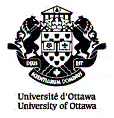|
Bettering the Best: CITO Research Partnerships Program
Major Objectives
-
To identify, develop and adapt formal verification and test techniques
to evolving best practices in E-Commerce development.
-
To model and co-develop new cost-effective, comprehensive strategies
and methods for certification, branding or granting logos for third
party electronic commerce applications.
-
To investigate and further develop risk-based testing and verification
metrics.
-
To adapt formal verification and test methods to assure the security
of e-commerce systems at the requirements and design phases.
-
To incorporate
multi-media concerns and challenges in each of the above.
Progress Towards
Objectives
-
Collaboration among Probert, Qing Li, and Yiqun Xu (student of
Williams) resulted in a new scenario language Simpl-T, for describing
test cases as scenarios. A paper on this language has been accepted
for 4th International SAM Workshop, June 1-4, 2004.
This may be one of the first semantic bridges between UML and a
specific test language. This work is part of the Masterís thesis by
Qing Li which she will defend in mid-May, 2004. Another of Probertís
students, Wei Xu, is developing a J2EE process (the standard for
e-commerce development) which includes a translation tool from TTCN-3
(international standard testing language) to Java byte code to enable
the use of HTTP-Unit, an open-source test tool for Web applications.
The related thesis should be submitted by the end of the summer. Very
recently, Ural and his students have developed a toolset to reduce the
size of regression tests for state-based systems, and now is working
with Chen and Probert to study related test generation and selection
problems with respect to automation of some of the test process.
-
Objective 2 had to be deprecated due to transfer and replacement of an
IBM co-worker.
-
Yanping Chen, an IBM CAS Doctoral Fellowship holder, and doctoral
student of Probert and Ural, is continuing to make progress on
identifying and developing new quality/cost metrics for the e-commerce
test process, in ongoing meetings with IBM e-commerce test engineers
and managers. A workshop/Paper is in preparation for CASCon 2004. A
related publication is: R.L. Probert, Y.Chen, M. Cappa, P.Sims,
B.Ghazizadeh, ďFormal verification and validation for e-commerce:
theory and best practicesĒ, Journal of Information and Software
Technology 45 (2003), 763-777. Williams has obtained some new results
on making configuration tests take into account risk-coverage
requirements.
-
Peter Qi Qiu, a student of Probertís, is extending the work by V Sawma,
a previous IBM CAS scholar under Probertís supervision, and has been
the driving force behind the development of a prototype e-commerce
system to make currency exchanges for U.S. dollars, called the EX
system. This system is developed as a system under test to aid in
teaching and research into e-commerce testing. Security issues are
still under development. A related paper is: V. Sawma, R.L. Probert,
"E-commerce authentication, an effective countermeasures design
model", IEEE Int. Conf. on Electronic Information Security, Angers,
France, 129-138, April, 2003. Yiqun Xu is currently on a summer
internship at the IBM Almaden laboratory (supervisor: Savitha
Srinivasan) in San Jose. He is working on a security system for
authorizing Eclipse plug-ins.
-
Some substantial progress has been made in the development of User
Interface and Usability tests for web applications in general under
the leadership of Dr. El-Saddik. Students Majdi Rawashdeh and
Jianming Ke developed a metadata tagging system that supports
internationalization. One of our major progress points is our paper ďA
Framework for Distributed Multimedia Content AdaptationĒ to be
presented at the IEEE/ACM QShine'2004, Oct 18-20, 2004 Dallas, TX.
This present an infrastructure for trans-coding multimedia streams.
The infrastructure takes into consideration the profile of
communicating devices, network connectivity, exchanged content format,
context description, and available adaptation services to find a chain
of adaptation services that could be applied to the content. Part of
the infrastructure is a selection algorithm that finds the best
sequence of adaptation services that can maximize the userís
satisfaction with the delivered content. Majdi is at the moment
focusing on the localization of on-line content for handling cultural
diversities that exist. Jinaming is now concentrating on developing
parameters to measure web services efficiency, loads, etc.
Students Involved:
Qing Li (MCS)
Yiqun Xu (Ph.D)
Wei Xu (MCS)
Yanping Chen
(MCS)
Peter Qi Qiu (MCS)
Victor Swama
(MCS, 2003)
Majdi Rawashdeh (MCS)
Jianming Ke (MCS)
|




![]()